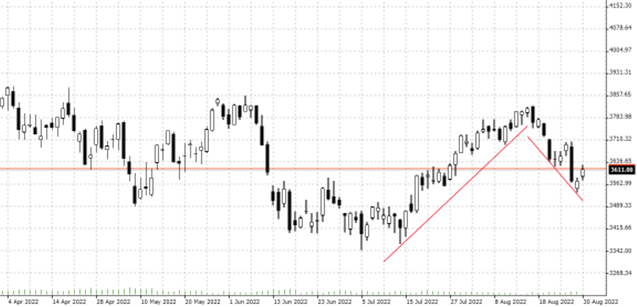

30.08.2022 – Europe could lurch into crisis – and the EuroStoxx 50 right along with it. The old continent is facing some epoch-making tests. And presumably in the midst of the looming recession, the European Central Bank is launching a restrictive monetary policy. This is another lesson from the symposium in Jackson Hole last weekend.
The EuroStoxx 50 – shown here in the daily chart – had recently tended to benefit from the weak euro. This makes European goods cheaper abroad. But this could soon be over.

Source: Bernstein Bank GmbH
Because the European Central Bank is probably planning a hefty interest rate hike – which should cap inflation, but not the rise in energy prices. And it will also cut demand in the middle of a looming recession. For example, in the construction sector or in retail.
Jumbo Move
For example, Bloomberg reported after the Jackson Hole symposium that a large minority of decision-makers within the ECB are ready for a big 75 basis point rate move. Thus, a “jumbo move” is quite conceivable to curb high inflation. In other words, as the Federal Reserve demonstrates determination to tighten, Europe can no longer hesitate. This is because the weak euro is importing inflation into Euroland via all imports from grain to energy. Inflation in the euro area had risen to a new record of 8.9 percent in July- more than four times the target of 2.0 percent.
Big interest rate move ahead
Reuters added that on Saturday, leading European central bankers had spoken accordingly at the Monetary Policy Symposium in Jackson Hole. Both ECB Director Isabel Schnabel and the central bank chiefs of France and Latvia, Francois Villeroy de Galhau and Martins Kazaks, had advocated significant rate hikes to combat runaway inflation. Kazaks, for example, put 50 to 75 basis points into play. He added that the money market had already priced in 67 percent of a 75 basis point rate hike in Euroland. Before Jackson Hole, the probability of such a move was only 24 percent.
Threats everywhere
It is not only monetary policy that threatens the turnover of European companies. The middle class has been expropriated for years by the European Central Bank’s zero interest rate, which is just now culminating in inflation. Purchasing power is also threatened by politics: On the one hand, there is the screwed-up energy transition, which pushed prices up even before the Ukraine war. Further, supply shocks from the policy response to Corona. The citizens, who are already being hammered by high taxes and social security contributions, receive little or nothing in return from politics: imported crime, intolerable conditions in many schools.
One believe, it ferments in Euroland. In France, high-ranking former generals warned against intervention some time ago. In Germany, the deployment of the Bundeswehr at home is being discussed. In short, we are curious to see whether Europe is in for a hot autumn. For example, a blackout on cold days. With consequences for the stock market. Bernstein Bank keeps an eye on the market for you.
The content of this publication is for general information purposes only. In this context, it is neither an individual investment recommendation or advice nor an offer to purchase or sell securities or other financial products. The content in question and all the information contained therein do not in any way replace individual investor- or investment-oriented advice. No reliable forecast or indication for the future is possible with respect to any presentation or information on the present or past performance of the relevant underlying assets. All information and data presented in this publication are based on reliable sources. However, Bernstein Bank does not guarantee that the information and data contained in this publication is up-to-date, correct and complete. Securities traded on the financial markets are subject to price fluctuations. A contract for difference (CFD) is also a financial instrument with leverage effect. Against this backdrop, CFD trading involves a high risk up to the point of total loss and may not be suitable for all investors. Therefore, make sure that you have fully understood all the correlating risks. If necessary, ask for independent advice. CFDs are complex instruments and are associated with the high risk of losing money quickly because of the leverage effect. 68% of retail investor accounts lose money trading CFD with this provider. You should consider whether you understand how CFD work and whether you can afford to take the high risk of losing your money.7
